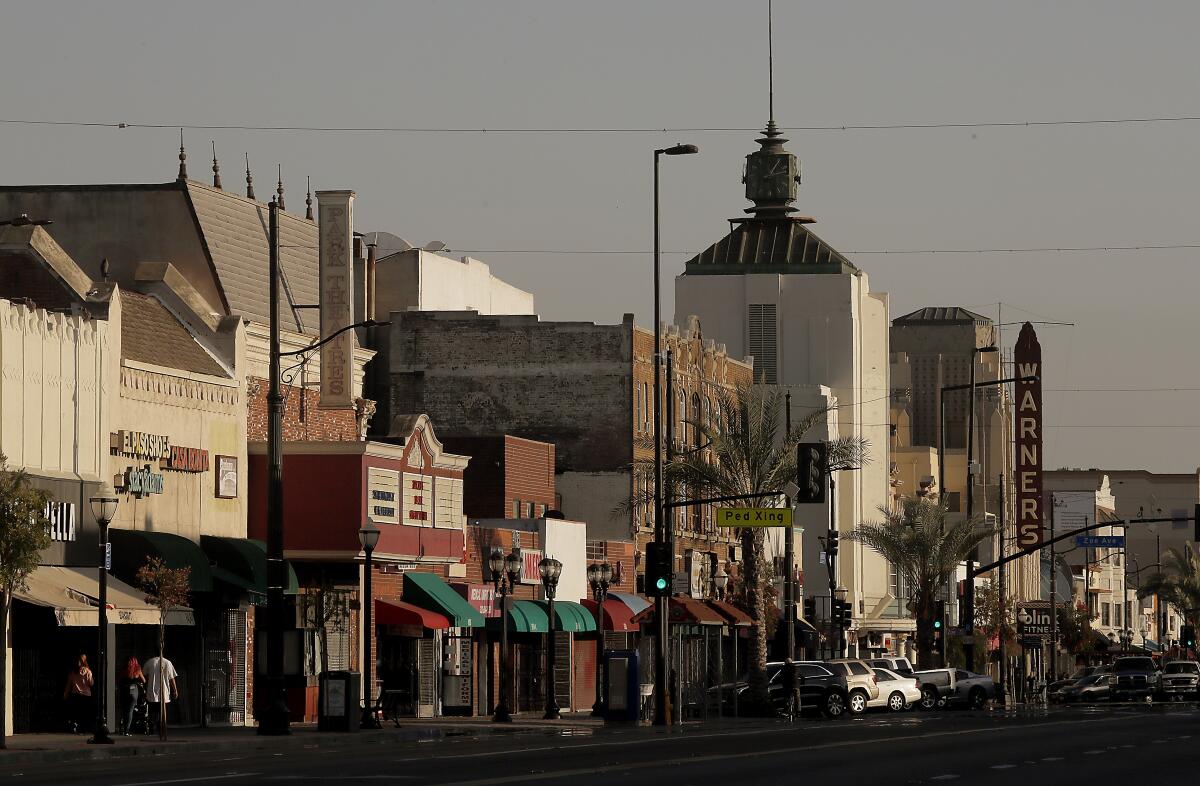Huntington Park agrees to settlement on illegal detention of immigrants

- Share via
After Huntington Park police arrested Jose Luis Maldonado Aguilar on suspicion of public intoxication, they didn’t book him with a crime.
Instead, they detained him until immigration officials could pick him up.
During his 46 days at an immigration detention center in the high desert, he lost his job as a construction worker, and several of his cars were repossessed, according to his attorneys. His family almost became homeless.
Maldonado, 45, sued the city and its police department, claiming that they violated the California Values Act, a state law preventing local police from questioning and holding people on immigration violations.
In a settlement reached Wednesday, Maldonado will receive $10,000. The city agreed to end detentions based on requests from immigration enforcement agencies.
As part of the settlement, the city is also donating $74,100 to an immigrant advocacy organization, the Council of Mexican Federations in North America, and will hold an annual forum to educate the public about immigration enforcement.
Huntington Park, a city of about 54,000, is 97% Latino.
According to records obtained by the American Civil Liberties Union and cited in the lawsuit, Huntington Park Police Department transferred at least 29 people to immigration officials “on the sole basis of an immigration detainer request” from January 2018 to August 2019.
The city was operating under a “de facto policy of detaining individuals based on immigration detainer requests” from U.S. Immigration and Customs Enforcement, the lawsuit said.
In nearby Los Angeles, the LAPD has long had a tolerant posture toward immigrants in the country without documentation. Special Order 40, adopted in 1979, prohibits officers from initiating contact with anyone for the sole purpose of learning their immigration status and rules out arrests for violating immigration law.
Longtime Los Angeles Police Chief Daryl F.
Maldonado’s attorneys said he was not available for interviews.
“Jose is thrilled that something is in place that will prevent other people from being separated from their families and losing their jobs and, you know, having their family live in fear of never seeing them again because the police department acted illegally,” said one of his attorneys, Ellen Leonida of the San Francisco law firm BraunHagey & Borden, which represented Maldonado free of charge.
Huntington Park Mayor Eddie Martinez, city council members and Police Chief Cosme Lozano did not respond to requests for comment.
Roger A. Colvin, an attorney who represents the city and Police Department, said police officials were “in the process of implementing the California Values Act,” which took effect in 2018. Maldonado was arrested on July 15, 2019.
“Rather than engaging in a long and costly court case, the city self-reflected and wanted something positive to come from this,” Colvin said. “That result was achieved in the settlement.”
After Maldonado was arrested, he was held overnight by Huntington Park police, even though they never booked him for a crime, after immigration officials requested that he be detained.
Eventually, immigration officials arrived, handcuffed Maldonado and took him to the Adelanto ICE Processing Center.
Maldonado, who is in the country without proper documentation, was eventually released and not deported, but the 46 days he spent at Adelanto brought him and his family to the brink of financial ruin.
California lawmakers on Saturday passed a “sanctuary state” bill to protect immigrants without legal residency in the U.S., part of a broader push by Democrats to counter expanded deportation orders under the Trump administration.
In Huntington Park on Friday, Henry Lozano said that $10,000 didn’t seem to be adequate compensation for what Maldonado went through.
“But if it stops people from being deported, which is madness, then I guess that’s good,” said Lozano, a baker from South Gate who was shopping at Northgate González Market.
Down the street at Salt Lake Park, Huntington Park resident Sonia Chaidez said about half of her extended family lacks papers, and there is always “a terror someone could be sent away.”
“People just want to work and live their lives,” said the 37-year-old waitress. “If you’re not committing serious crimes or are a danger to society, why should you be deported?”
More to Read
Sign up for Essential California
The most important California stories and recommendations in your inbox every morning.
You may occasionally receive promotional content from the Los Angeles Times.












